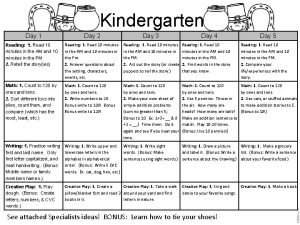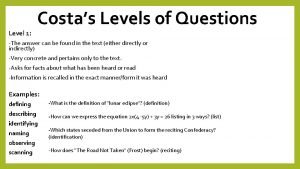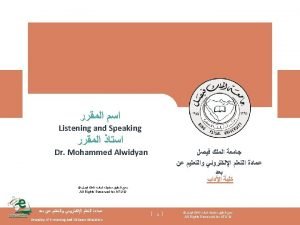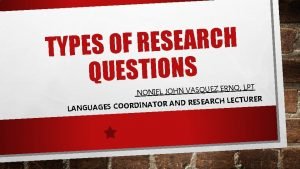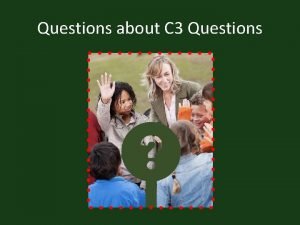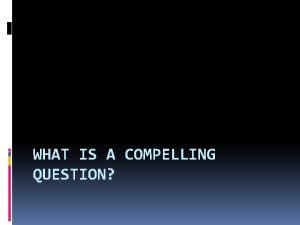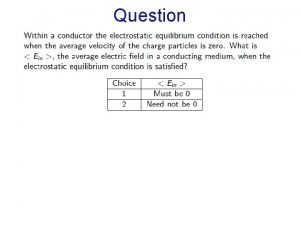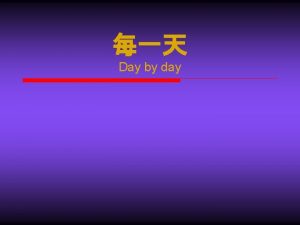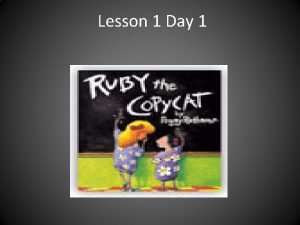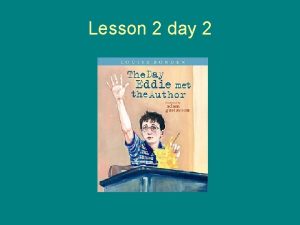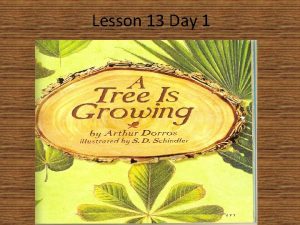Lesson 20 Day 2 Question of the Day










- Slides: 10

Lesson 20 Day 2

Question of the Day • How do you feel when you read a good book? • When I read a good book, I feel _____.

Read Aloud Books By Eleanor Farjeon How does the speaker in the poem feel about books? Explain. What does the speaker mean when he or she says “Here’s our body in the chair, /But our mind is over there? ” What worlds of wonder are our books! As one opens them and looks, New ideas and people rise In our fancies and our eyes. The room we sit in melts away, And we find ourselves at play With someone who, before the end, May become our chosen friend. Or we sail along the page To some other land or age. Here’s our body in the chair, But our mind is over there. Each book is a magic box Which with a touch a child unlocks. In between their outside covers Book hold all things for their lovers.

Phonics and Spelling • Find the letters that stand for the /ur/ sound. • fern • er • girl • ir • turn • ur • work • or • earth • ear • Can you think of other words with the /ur/ sound? • Write these words in your journal and circle the /ur/ sound. • clerk • hurt • heard • worm • thirty

Focus Skill Compare and Contrast • Turn to pages 144 -151 and skim back over the text. • Whom did Chris and Casey interview? • A director, a designer, a crew leader • Take two of the people they interviewed and write in your journal how they are alike and different. • Copy the diagram in your journal and compare and contrast the two people you chose. Be prepared to share with your group.

Prefixes and Suffixes • Prefixes are word parts added to the beginning of root words. • Knowing the meaning of a prefix can help you understand words. • un- not • re- again • dis- not • • unsafe un/safe remake re/make disagree dis/agree Prefixes add syllables to root words. Suffixes are word parts added to the end of a root word to form a new word. -er - more -est – most -ly –in a way -ful – full of faster hungriest slowly thankful

tragic • It was tragic that he forgot his part of the performance. • A tragic event is something that is both sad and horrible. • The word is… • tragic • What is the word? • tragic • What would be tragic – an earthquake or a shopping trip?

limp • My whole body grew limp. • When something is limp, it is too weak to move or support itself. • The word is… • limp • What is the word? • limp • What might make your arm go limp – writing for hours or shaking hands with the principal?

DOL shorter D M • 4. dan is shortest than mandy. The • 5. an apples are red.

Grammar: Adjectives that Compare • Adjectives that compare show the relationship between 2 or more things. • Use –er or more for adjectives that compare 2 things. • Use –est or most for adjectives that compare 3 or more things. • Use more or most for adjectives that are 3 or more syllables long. faster fastest slower slowest
 Day 1 day 2 day 3 day 4
Day 1 day 2 day 3 day 4 Costas level of questions
Costas level of questions Day 1 day 2 day 817
Day 1 day 2 day 817 Present simple question words
Present simple question words Closed question example
Closed question example Contoh open-ended question
Contoh open-ended question An example of a factor-isolating question.
An example of a factor-isolating question. Question direct
Question direct Compelling and supporting questions
Compelling and supporting questions Compelling and supporting questions
Compelling and supporting questions Hình ảnh bộ gõ cơ thể búng tay
Hình ảnh bộ gõ cơ thể búng tay
